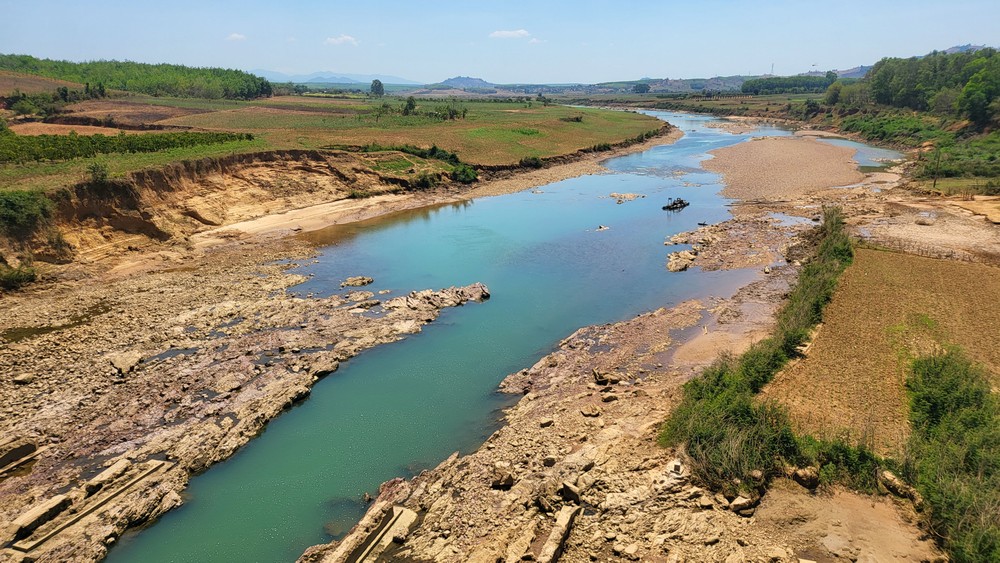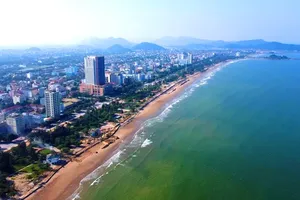
Residents in the region are grappling with crippling drought which results in dried fields and withered coffee trees.
Dried fields
The Po Co river under the Kroong bridge in Kroong Commune of Kon Tum City has dried up and is bare of rocks. On the riverbank, resident A Xoan was busy using machines to pump water to water dozens of dry trees whose leaves were withered due to lack of water in his coffee garden. He moaned that this year is dry, the river water is low, so the family members must use machines to pump water and put all their efforts into saving the coffee.
According to the People's Committee of Kon Tum Province, from March to May, drought and water shortages are highly likely to occur on a large scale, especially in areas such as Kon Tum City and Sa Thay, Ia H'Drai, Dak Ha, Dak To, Ngoc Hoi, Kon Ray, Nam Dak Glei districts where people are not proactive to reserve water. The local government predicted that more than 1,700 hectares will be likely to be dry due to crippling drought.
To cope with drought and water shortage, the People's Committee of Kon Tum Province said it has asked localities to speed up the construction progress of dams and reservoirs to combat drought. In case of water shortage, local authorities will transport water from other places to help people during the time. Drought is also raging in many localities of Gia Lai province. For instance, hundreds of hectares of rice paddies in the growing stage, sweet potatoes and corn lands are facing the risk of water shortage in Ia Pa and Phu Thien districts.
According to Deputy Director Vu Ngoc An of Gia Lai Department of Agriculture and Rural Development, in the immediate future, the department requested administrations in districts, towns and people to strictly manage water sources in addition to application of economical irrigation methods for rice and upland crops.
In the long term, the department continues to advise the Provincial People's Committee to suggest the Government and the Ministry of Agriculture and Rural Development pay attention to speeding up investment in the construction of large irrigation projects with new reservoirs to deal with water shortage in several areas which are frequently affected by drought.
Elsewhere in Dak Nong Province, many fields in Krong No district have withered and dried up due to intense sunlight and lack of water. Water levels in many lakes and dams in this locality have dropped below the drought warning alert; as a consequence, there is not enough water for irrigation.
According to statistics from the Department of Agriculture and Rural Development of Krong No district, currently, there are 1,500 hectares of crops in Nam Xuan and Dak Sor communes lacking water. About 30 percent of 1,500 hectares of crops are coffee, pepper, and fruit trees that do not have enough water; therefore, they are dying.
Deputy Director Nguyen Tuong Duy of Dak Nong Irrigation Works Exploitation Company Limited, said that currently, the water level of most irrigation works in the province has decreased sharply compared to the same period in 2023, and there is a risk of water shortage for trees. Therefore, the company has developed plans with a focus on regulating water sources for areas lacking water.
At the same time, the company recommended that local administrations should encourage people to use water economically while clearing ditches and streams.
Lack of water for daily activities
The Central Highlands Province of Lam Dong is also facing a serious shortage of water for crops and daily activities.
Deputy Director Phan Viet Ha of the Central Highlands Institute of Agricultural and Forestry Sciences assessed that in the face of current climate change, drought is likely to prolong; thus, it will cause disadvantages for many crop areas in the Central Highlands. Authorities must develop solutions to combat drought as well as guide farmers to switch to other crops to suit the local climate meanwhile people should improve thinking in production and grow crop varieties that are economically effective and have high drought resistance.
On March 5, the Office of the Steering Committee for Natural Disaster Prevention, Control and Search and Rescue in the Southern Province of Binh Phuoc announced through a field inspection in Bu Gia Map district, more than 300 households in Dak O and Bu Gia Map communes have been facing serious water shortages while about 100 hectares of crops in these communes lack irrigation water and trees in the land have suffered from extensive damage or been killed completely. If the hot weather lasts, it is expected that about 2,170 hectares of crops will lack irrigation water and about 805 households will lack domestic water.
If the hot weather continues until mid-March, the government in Loc Ninh District said that more than 300 hectares of crops will lack irrigation water and more than 300 households will lack water for daily activities. Chief of Office of the Steering Committee for Natural Disaster Prevention and Control in Binh Phuoc Province Nguyen Van Quyet said that the committee has asked the people's committees of Bu Gia Map and Loc Ninh districts to have measures to provide water for people’s daily activities.
























